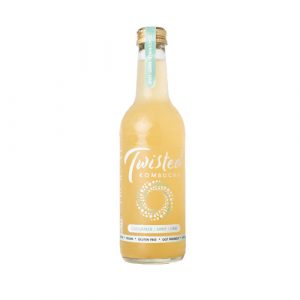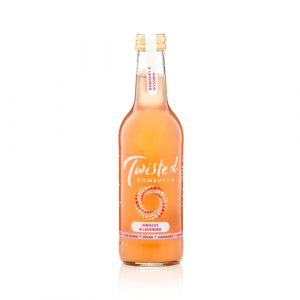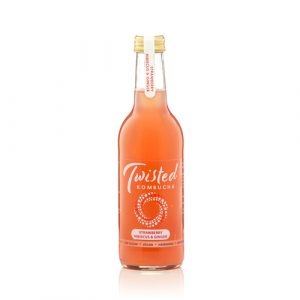
As a Food Scientist and Nutritionist, I’m excited to delve into the world of low alcohol kombucha with you. Kombucha, often hailed as the “original kombucha,” has been making waves in the realm of gut health and wellness. In recent years, a unique variety has gained popularity: low alcohol kombucha. This delightful beverage offers a refreshing twist on the classic original kombucha, providing not only the probiotic benefits but also a hint of alcohol. Join me on this journey as we explore how low alcohol kombucha can benefit your digestion and overall well-being. Plus, keep an eye out for insights into Twisted Kombucha, a brand that’s redefining the kombucha experience.
Understanding Low Alcohol Kombucha
Low-alcohol kombucha, also known as “original kombucha with a twist,” has been gaining traction in the UK, with a surge in demand over recent years. This innovative variation retains the core probiotic-rich and gut-boosting qualities of traditional kombucha but introduces a subtle twist – a low alcohol content. To grasp the essence of this beverage, it’s essential to understand its key components.
In the UK, where health-conscious consumers increasingly seek functional and flavorful beverages, low alcohol kombucha offers an enticing option. With the kombucha market on the rise, the introduction of this twist has caught the attention of those looking to support their digestive health while enjoying a mild alcoholic beverage.
Low-alcohol kombucha typically contains less than 0.5% alcohol by volume (ABV), making it a suitable choice for those who desire the tangy, effervescent profile of kombucha but wish to limit their alcohol intake. This level of alcohol is comparable to the natural fermentation process in certain foods and beverages, such as ripe fruit.
The Benefits of Low Alcohol Kombucha
Now, you might be wondering, what are the benefits of opting for low alcohol kombucha instead of the original variety? Well, low alcohol kombucha retains many of the health benefits associated with traditional kombucha. It makes for a compelling choice for those seeking a refreshing and health-conscious beverage. Here are some of the advantages:
- Digestive Health Support: Like its non-alcoholic counterpart, low alcohol kombucha is packed with live probiotics that can aid digestion and promote gut health.
- Mild Alcohol Content: With less than 0.5% ABV, it offers a gentle and controlled alcohol intake, making it suitable for individuals who prefer lower-alcohol options.
- Balanced Flavor Profile: Low alcohol kombucha retains the signature tangy, slightly sour taste of traditional kombucha while introducing subtle alcoholic notes, creating a unique and balanced flavor profile.
- Hydration: Kombucha is primarily water-based, making it a hydrating beverage choice.
- Rich in Antioxidants: It contains antioxidants like tea polyphenols, which may contribute to overall well-being.
- Low in Calories: Low alcohol kombucha is typically low in calories, making it a favorable option for those watching their calorie intake.
- Versatile Beverage: It can be enjoyed on its own as a refreshing drink or used as a mixer in cocktails and mocktails.
How Does Low Alcohol Kombucha Benefit Digestion?
What you might find particularly intriguing is how low alcohol kombucha can benefit your digestion. Here’s the scoop:
Supports Gut Health: Just like its higher-alcohol counterpart, low alcohol kombucha promotes the growth of beneficial gut bacteria. These friendly microbes play a crucial role in maintaining a balanced gut microbiome, which is essential for optimal digestion.
Reduced Bloating and Gas: Are you tired of dealing with bloating and gas after meals? Low alcohol kombucha might offer some relief. Its natural enzymes can help ease digestive issues and provide comfort.
Anti-Inflammatory Properties: Certain compounds found in kombucha, such as tea polyphenols, have anti-inflammatory properties. Chronic inflammation is believed to be a contributing factor in IBS, and these properties may help alleviate inflammation.
Managing Stress: It’s well-documented that stress can exacerbate IBS symptoms. Kombucha’s potential calming effect, attributed to the presence of L-theanine in tea, may help individuals manage stress and, in turn, mitigate IBS symptoms.
Enhanced Nutrient Absorption: Improved gut health facilitated by kombucha’s probiotics may enhance nutrient absorption, which can be particularly important for individuals with IBS who may have nutrient absorption issues.
Introducing Twisted Kombucha
Now that you’re well-acquainted with the digestive benefits of low alcohol kombucha, let me introduce you to a brand that’s making waves: Twisted Kombucha.
Twisted Kombucha offers a delightful range of low alcohol kombucha varieties that not only support digestion but also tantalize your taste buds. Furthermore, our Carefully crafted flavors provide a refreshing alternative to sugary beverages while delivering all the goodness of kombucha.
Conclusion
So, there you have it, a journey into the world of low alcohol kombucha and its remarkable digestive perks. Whether you’re sipping it for improved digestion, overall wellness, or simply because it’s delicious, low alcohol kombucha is a delightful addition to your daily routine. Cheers to your digestive health and enjoyment! Visit our website to learn more.
FAQs
Is low alcohol kombucha suitable for an alcohol-free diet?
Probiotics are living microorganisms that offer health advantages when ingested in sufficient quantities. They support the immune system by promoting a healthy gut microbiome, where a significant portion of our immune cells resides. A balanced gut microbiome can enhance the body’s ability to fight off infections.
Is low alcohol kombucha safe during pregnancy or nursing?
It’s best to consult your healthcare provider before consuming low alcohol kombucha while pregnant or nursing. Generally, it’s considered safe, but individual circumstances vary.
Are the digestive benefits of low alcohol kombucha similar to traditional kombucha?
Yes, low alcohol kombucha offers digestive benefits similar to traditional kombucha. It contains probiotics, antioxidants, and beneficial acids that support gut health and digestion. Thus, it’s a great option for those seeking these benefits with reduced alcohol content.














